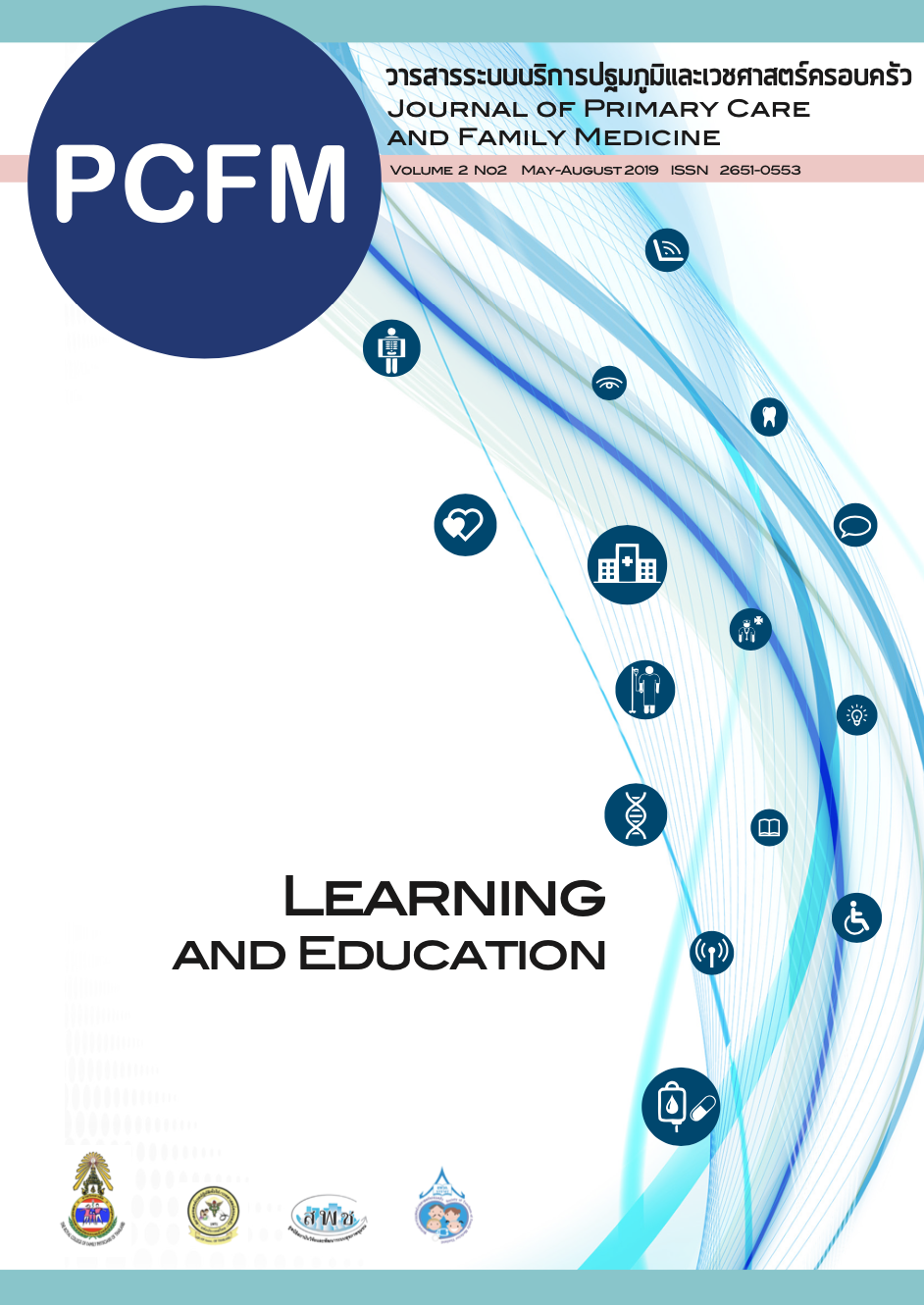การสร้างชุมชนการใช้หลักฐานการแพทย์เชิงประจักษ์ในเวช ปฏิบัติครอบครัว : การประยุกต์ทฤษฎีคอนสตรัคติวิสต์เชิงสังคม
Main Article Content
บทคัดย่อ
การแพทย์เชิงประจักษ์ (evidence-based-medicine) เป็นหัวข้อการเรียนการสอนที่มีความท้าทายสำหรับเวชปฏิบัติในปัจจุบัน โดยเฉพาะในบริบททางสังคมที่มีการทำงานอย่างแยกส่วนและมีปฏิสัมพันธ์ต่อกันน้อยทำให้มีข้อจำกัดในการเรียนรู้และการแลกเปลี่ยนประสบการณ์ในบรรยากาศที่เป็นมิตร การสร้างบรรยากาศที่เป็นมิตรและสร้างแหล่งเรียนรู้ที่เหมาะสมเป็นสิ่งจำเป็น โครงการสร้างชุมชนการใช้หลักฐานการแพทย์เชิงประจักษ์ (community of Evidence-based practice) โดยประยุกต์จากทฤษฏีการศึกษา โซเชี่ยวคอนสตรัคติวิซึม (social constructivism educational theory) และหลักการของชุมชนนักปฏิบัติ(Community of Practice) เป็นแนวคิดในการสร้างแหล่งเรียนรู้และพัฒนาศักยภาพของบุคคล โดยเริ่มจากอาจารย์ที่มีความสนใจด้านเวชศาสตร์เชิงประจักษ์รวมตัวกันสร้างเป็นชุมชนให้เป็นทรัพยากรบุคคลสำหรับสอนนักศึกษาแพทย์ แพทย์ประจำบ้าน และสหวิชาชีพ การสร้างชุมชนการใช้หลักฐานการแพทย์เชิงประจักษ์ (community of evidence-based-practice) ในเวชปฏิบัติครอบครัวจะสามารถลดอุปสรรคความยากในการนำเวชศาสตร์เชิงประจักษ์ไปใช้ได้เนื่องจากเกิดจากการร่วมวางแผนและออกแบบจากผู้ที่มีความสนใจร่วมกันและสามารถสร้างนวัตกรรมทางการศึกษาทางการแพทย์ให้เกิดขึ้นได้ต่อไป
Article Details
เนื้อหาและข้อมูลในบทความที่ลงตีพิมพ์ในวารสาร PCFM ถือเป็นข้อคิดเห็นและความรับผิดชอบของผู้เขียนบทความโดยตรง ซึ่งกองบรรณาธิการวารสารไม่จำเป็นต้องเห็นด้วยหรือร่วมรับผิดชอบใด ๆ
บทความ ข้อมูล เนื้อหา รูปภาพ ฯลฯ ที่ได้รับการตีพิมพ์ลงในวารสาร PCFM ถือเป็นลิขสิทธิ์ของวารสาร PCFM หากบุคคลหรือหน่วยงานใดต้องการนำทั้งหมดหรือส่วนหนึ่งส่วนใดไปเผยแพร่ต่อหรือเพื่อกระทำการใด ๆ จะต้องได้รับอนุญาตเป็นลายลักษณ์อักษรจากวารสาร PCFM ก่อนเท่านั้น
เอกสารอ้างอิง
2. Price DW, Felix KG. Journal clubs and case conferences: from academic tradition to communities of practice. The Journal of continuing education in the health professions. 2008;28(3):123-30.
3. Wenger E, McDermott R, Snyder WM. Cultivating Community of Practice: a guide to managing knowledge. Boston,Massachusetts: Harvard Business School Press; 2002.
4. Russell J, Greenhalgh T, Boynton P, Rigby M. Soft networks for bridging the gap between research and practice: illuminative evaluation of CHAIN. BMJ (Clinical research ed). 2004;328(7449):1174.
5. Sherer PD, Shea TP, Kristensen E. Online Communities of Practice: A Catalyst for Faculty Development. Innovative Higher Education. 2003;27(3):183-94.
6. Vygotsky LS. Mind in Society: The Development of Higher Psychological Processes. Cambridge: Harvard University Press; 1978.
7. Jing S. Compare and Contrast of Constructivism and Community of Practice. 3rd International Conference on Social Science, Management and Economics (SSME)2017.
8. Woo Y, Reeves TC. Meaningful interaction in web-based learning: A socialconstructivist interpretation. Internet and Higher Education. 2007;10:15-25.
9. Kim B. Social Constructivism [pdf]. M. Orey; 2001 [updated 25 June 2012. Available from: http://cmapsconverted.ihmc.us/rid=1N5QXBJZF-20SG67F-32D4/Kim%20Social%20constructivism.pdf.
10. Wenger E. Communities of practice : Learning,Meaning,and Identity. United States of America: Cambridge University press; 2008.
11. Ranmuthugala G, Plumb JJ, Cunningham FC, Georgiou A, Westbrook JI, Braithwaite J. How and why are communities of practice established in the healthcare sector? A systematic review of the literature. BMC health services research. 2011;11:273-.
12. Malterud K. The social construction of clinical knowledge – the context of culture and discourse. Commentary on Tonelli (2006), Integrating evidence into clinical practice: an alternative to evidence-based approaches. Journal of Evaluation in Clinical Practice. 2006;12:248-56.


